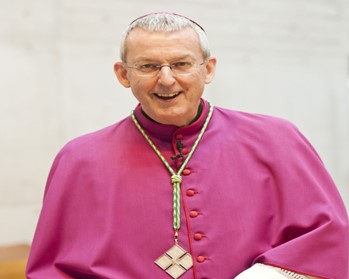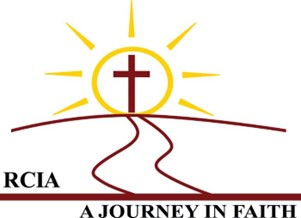Catholicism is the most ancient and enduring form of Christianity. Jesus sent his apostles, under the authority of St Peter, to go and proclaim his love to the world – to proclaim that through the life, death and resurrection of Jesus, we find new life; right relationship with God and each other; and the promise of eternal life.
Today the Catholic Church, guided by the bishops, the successors of the apostles, continues this same mission. It does so under the leadership of Pope Francis, who is the successor of Peter. At the heart of Catholic belief is the fact that Jesus becomes truly present in Holy Communion when we celebrate Mass; and that we encounter God in a special way in the seven Sacraments of the Church.
At St Michael’s, we seek to live out this faith in worship and in action. We are all invited to deepen in this faith and we are always delighted to help others to encounter it too. Let us know if you want to find out more.

To become a Roman Catholic, it is usual for an interested adult to attend a course entitled the Rite of Christian Initiation of Adults (RCIA), sometimes called “A Journey in Faith”.
Interested adults should approach Father Isidore in the first instance, who will give guidance on the way forward. The RCIA course is held in relaxed surroundings in a very informal atmosphere. Everyone is invited to share his or her faith story, and the aim is to expand our knowledge of the Catholic Faith while getting to know one another better.
Attending an RCIA course involves no obligation to carry through to being received into the Catholic Church. Everyone is free to finish at any time and, at the end of the course for that year, everyone is free to feel that they are not ready at that point, but might like another year (or more) for discernment.
“Catechumens” are those people who are to be received into the Catholic Church but who have never been baptised. Reception into the Catholic Church will normally take place at Easter, during the Easter Vigil Mass on the evening of Holy Saturday. At the Vigil, Catechumens will receive the Sacrament of Baptism and the Sacrament of Confirmation, and then will receive their First Holy Communion (the Sacrament of the Eucharist).
“Candidates” are those people who have been baptised already, but into another Christian denomination. In most cases, that baptism will be accepted by the Catholic Church. As with Catechumens, reception will normally take place during the Easter Vigil Mass but, in this case, Candidates will require only to receive the Sacrament of Confirmation, and then will receive their First Holy Communion (the Sacrament of the Eucharist).

The Mass is the most important prayer for Catholics. On Sunday we gather together for this time of worship in support of each other and to give praise to God. It is a time to listen to God’s word and, through the offering of bread and wine, to bring our joys and sorrows to God, who transforms our offerings into the Body and Blood of Jesus in Holy Communion.
The Mass, sometimes called ‘The Eucharist’ (meaning ‘thanksgiving’) is described by the Church as being “the source and summit of the Christian life.” Through the words of consecration spoken by the priest, Catholics believe that our Lord Jesus becomes truly present in Holy Communion. The bread and wine become Christ’s Body and Blood. Why do we believe this? Because Jesus tells us in John 6:55: “…my flesh is real food and my blood is real drink. As well as our main Sunday celebrations, the Mass is also celebrated several times during the week.

